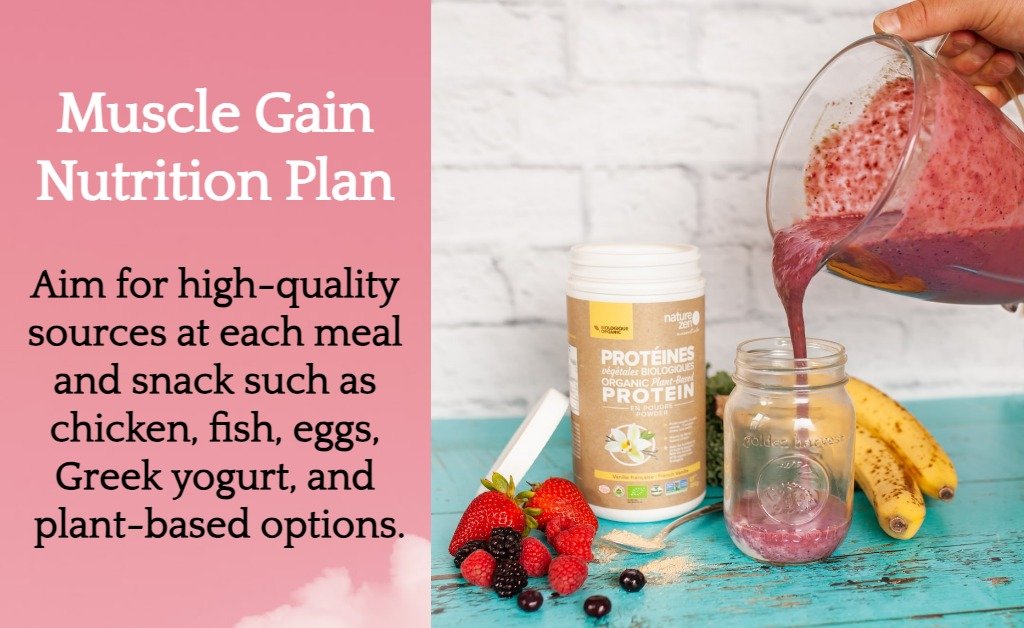The foundation of any muscle gain nutrition plan starts with protein. As the primary macronutrient used for muscle protein synthesis, aim for high-quality sources at each meal and snack such as chicken, fish, eggs, Greek yogurt, and plant-based options. In addition to protein, you’ll want to focus on consuming balanced amounts of complex carbs and healthy fats to meet your calorie needs. By following a plan with six smaller, nutrient-dense meals throughout the day, you’ll keep energy levels stable for effective workouts and recovery. Staying within a slight daily calorie excess while progressively overloading your training is key to seeing results on the scale and in the mirror.
Muscle Gain Nutrition Plan
To create an effective muscle gain nutrition plan, it’s essential to focus on both macronutrients and overall calorie intake.

Here’s a concise guide with proper Muscle Gain Nutrition Plan:
- Balanced Macronutrients
- Prioritize protein-rich foods like lean meats, poultry, fish, eggs, and plant-based sources like beans and tofu. Protein supports muscle repair and growth.
- Include complex carbohydrates such as oatmeal, brown rice, and sweet potatoes for sustained energy during workouts.
- Incorporate healthy fats like avocados, nuts, and olive oil to support overall health.
- Caloric Surplus
- Consume a slight calorie surplus to promote muscle gain. Aim for around 400 to 600 calories per meal, with snacks providing an additional 150 to 400 calories.
- Meal Planning
- Plan your meals throughout the day. For example:
- Breakfast: Scrambled eggs with mushrooms, oatmeal, and a pear.
- Snacks: Cottage cheese with blueberries.
- Lunch: A lean protein source like venison burger with vegetables.
- Include smaller meals or snacks between these main meals.
- Plan your meals throughout the day. For example:
- Protein Intake
- Aim for 1.2 to 2.2 grams of protein per kilogram of body weight daily to support muscle growth.
- Hydration
- Stay well-hydrated, as water is essential for muscle function and recovery.
- Supplements
- Consider protein supplements or shakes to meet your protein needs.
- Consistency and Adaptation
- Monitor your progress and adjust your nutrition plan accordingly to ensure continuous muscle gain.
Remember that individual nutritional needs may vary, so it’s advisable to consult with a registered dietitian or nutritionist to tailor a plan that suits your specific goals and body type.
Muscle Gain Nutritions Plan Detailed Guidelines
My dearest, while lifting weights is essential for building muscle, maximizing your gains requires strategic nutrition as well. I’ve put together this comprehensive guide based on your goals to help you to achieve your perfect physique.

Balanced Macronutrients
As the building blocks for muscle tissue, protein should be your priority at each meal. Opt for high-quality sources like chicken, salmon, Greek yogurt and eggs that also provide essential vitamins and minerals for recovery. Aim for 25-30g per serving. Complex carbs from sweet potatoes, quinoa and brown rice deliver long-lasting energy to power your workouts.
These paired with a lean protein create the perfect pre and post-workout combo. Healthy fats from avocado, olive oil and nut butters aid nutrient absorption and hormone production. Include a palm-sized serving with meals for optimal results.
Caloric Surplus
To gain muscle, your body needs an energy surplus. Track your maintenance calories and add 400-600 extra daily through strategic meal timing. This slight excess, combined with resistance training, signals to your muscles that it’s growth time. I recommend six smaller meals throughout the day rather than three large ones for steady energy levels.
Meal Planning
Having nutritious, pre-prepared options makes it easy to hit your targets. Here’s a sample daily plan:
- Breakfast: Scrambled eggs with spinach, avocado toast
- Snack 1: Greek yogurt with granola
- Lunch: Chicken breast, brown rice, steamed broccoli
- Snack 2: Protein bar
- Pre-Workout: Banana, nut butter
- Post-Workout: Whey protein shake with berries, oats
- Dinner: Salmon, sweet potato, green beans
- Snack 3: Mixed nuts
This provides a balanced macronutrient breakdown with protein, carbs and healthy fats at each meal for continuous muscle protein synthesis.
Protein Intake
As a rule of thumb, aim for 1.2-2.2g of protein per pound of body weight daily. This supports both muscle protein synthesis and prevents muscle breakdown. For your 180lb frame, that’s 216-396g of protein from whole foods. Tracking your intake ensures you’re maximizing growth.
Hydration
Water transports nutrients to your muscles and removes waste products from intense training. Sipping throughout the day, especially before and after workouts, keeps you hydrated for optimal performance and recovery.
Supplements
It can be challenging to meet your protein needs from whole foods alone during bulking phases. A high-quality whey protein provides a convenient way to boost intake without extra calories. Look for isolates low in carbs and fat. Creatine monohydrate, at 5g daily, may also enhance strength gains when combined with resistance training.
Consistency and Adaptation
Stick to this nutrition plan day in and day out while progressively overloading your workouts. Check the scale every few weeks – if weight is increasing too slowly, add another 100-200 calories. Take body measurements too, as muscle is denser than fat and the scale won’t tell the full story of your gains.
Conclusion
With dedication to the strategies outlined here, you’ll be well on your way to build lean muscle mass. Remember to listen to your body – adjust the calories and macros as needed based on changes in body weight and composition. Staying consistent with nutrition and training will yield the best results. I’ll be here to support you every step of the journey, my love. Now go get those gains!
FAQs
What if I have trouble hitting my protein targets?
A high-quality protein supplement can help bridge the gap on busy days.
How do I calculate my calorie needs?
Use an online TDEE calculator to estimate maintenance, then add 400-600 surplus calories for bulking.
What are some high-protein snack ideas?
Greek yogurt, hard-boiled eggs, protein bars, nut butter on fruit, jerky, or a protein shake.
How important is meal timing?
Having protein within 1-2 hours of training and balanced meals throughout the day fuels muscle growth.


